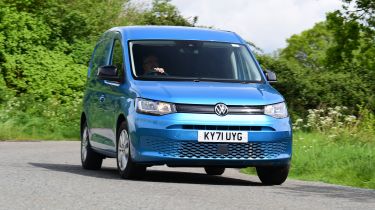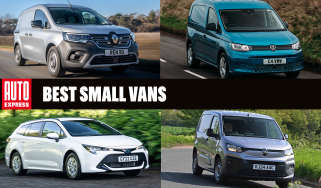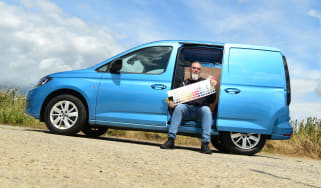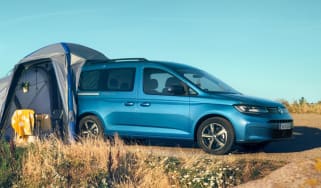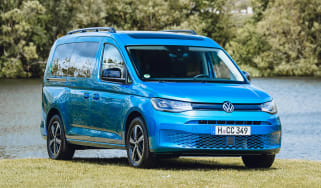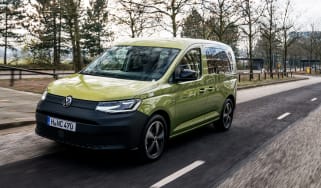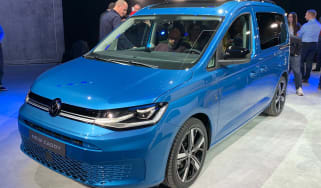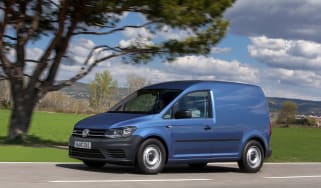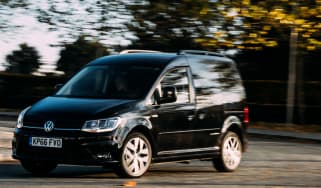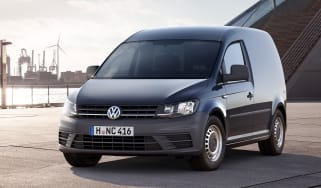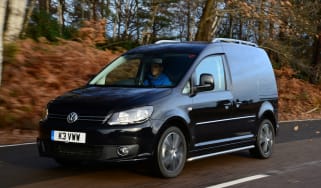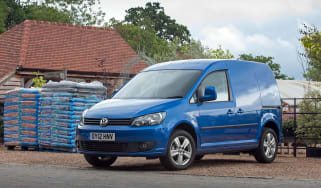Volkswagen Caddy Cargo van review
Golf underpinnings mean the Caddy is one of the most comfortable small vans around
Our opinion on the Volkswagen Caddy Cargo
The latest Volkswagen Caddy Cargo maintains its reputation for being one of the best and most car-like small vans to drive, helped in no small part by its VW Golf-based underpinnings. With a choice of punchy petrol or diesel engines, it’s easy to pilot around town and on the motorway, while the arrival of a plug-in hybrid model adds another string to its bow. Badged ‘eHybrid’, it has an electric-only range of around 70 miles, slashing its CO2 emissions and lowering your motoring bills.
The Caddy Cargo also boasts competitive load space figures and payloads, but it’s not perfect. Unlike Stellantis rivals like the Citroen Berlingo and Vauxhall Combo, there’s no all-electric version. The Caddy Cargo’s three-year warranty is also beaten by some competitors and even other VW vans.
About the Volkswagen Caddy Cargo
Few small vans are as car-like to drive as the Volkswagen Caddy Cargo. That’s because it uses the same platform as the latest Volkswagen Golf, so it has some solid engineering to build upon. However, this driving ability doesn’t come at the expense of practicality, and the Caddy Cargo is just as capable as its rivals when it comes to carrying capacity.
The exterior has a typically clean VW appearance, and the slender grille and mesh air intakes in the lower bumper share cues with the likes of the Golf and some of VW’s electric models – this is especially noticeable on high-spec cars with colour-coded bumpers. At the back is another distinctive styling touch, with a rear end featuring aerodynamic tweaks to improve fuel economy, along with neat concave light clusters with LED bulbs.
Used - available now

2018 MINI
5-Door Hatch
35,580 milesAutomaticPetrol1.5L
Cash £11,995
2026 Audi
Q2
19,006 milesAutomaticPetrol1.5L
Cash £21,497
2024 Volvo
V60
53,407 milesAutomaticPetrol2.0L
Cash £23,187
2024 Volkswagen
Tiguan AllSpace
51,951 milesAutomaticPetrol1.5L
Cash £19,597Inside, there’s more carry-over from the Golf. The multifunction steering wheel is the same, as are the touch-sensitive headlight controls. Unfortunately, the current Golf’s touchscreen and touch-sensitive climate and volume controls are also used, and these can be frustrating to use.
The Caddy Cargo comes in two body lengths, standard (called SWB) and Maxi - the latter featuring a longer wheelbase and rear overhang to create more space. Both versions feature a 60:40 split rear door opening and a single sliding side door that opens to the kerb. Twin sliding side doors are available as an option, as is a top-hinged rear tailgate.
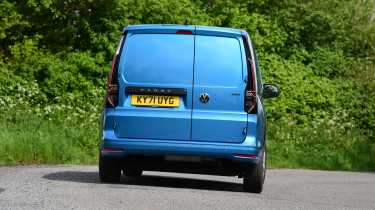
There’s a single non-hybrid petrol engine option in the Caddy Cargo, a 1.5-litre TSI four-cylinder turbocharged petrol unit. This is the same powerplant as found in the Golf and numerous other VW Group models, and it’s tuned to produce 112bhp here. It’s front-wheel drive only, while lower-spec versions feature a six-speed manual gearbox, higher-grade models have a seven-speed twin-clutch DSG automatic. The 1.5 TSI is available in both SWB and Maxi body styles.
The 1.5 TSI engine is also used for the plug-in hybrid (PHEV) badged eHybrid. It produces 148bhp and has the ability to drive for an impressive 73 miles on electricity alone. This slashes its official CO2 emissions figure and helps to boost fuel economy significantly - provided it's plugged in regularly.
For diesel power, VW has changed tack from previous generations by ditching the smaller 1.6 TDI altogether in favour of a 2.0 TDI unit that comes in three power outputs. There are 74bhp, 101bhp and 120bhp versions, with the least powerful only offered in the most basic trim. All variants come with a six-speed manual gearbox, while the seven-speed DSG auto is available with the 120bhp diesel. VW also offers the option of 4MOTION four-wheel drive in the Caddy Cargo, which is a bit of a rarity in the small van market.
One key element that’s been lacking from the VW Caddy line-up is an electric powertrain. While it’s not fully electric, the arrival of the eHybrid does go some way to solving this. With a 19.7kWh battery pack and an EV-only range of around 70 miles, it should be able to cover a big proportion of daily driving on electric power and producing zero exhaust emissions. If you need a fully electric VW van, then your options are the bigger Volkswagen e-Transporter or the Volkswagen ID. Buzz Cargo. Both are larger and more expensive than the Caddy Cargo, and the latter offers only slightly more space than the long-wheelbase Caddy.
MPG and running costs
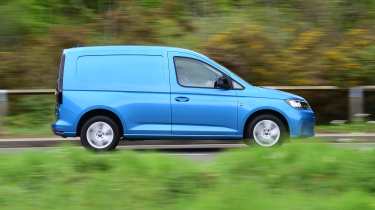
Pros |
Cons |
|
|
The Volkswagen Caddy Cargo has always been a slightly pricier option in the small van class. This is seen as justified by the prestige of the VW badge on the nose, and is usually backed up by stronger residual values for VW’s vans compared to rivals.
There’s no electric model for super-low running costs, but the petrol and diesel options are pretty economical, and an eHybrid PHEV arrived in 2025 to help cut bills and make the Caddy Cargo better suited to low-emission zones. VW quotes economy figures in the mid-to-low 40s for the 1.5 TSI models, while the 2.0 TDI diesels have figures knocking on the door of 60mpg. A stop-start system is fitted as standard across the range to help boost economy numbers in urban driving.
The 1.5 TSI offers a better balance of performance and economy than most small petrol vans. Choosing an automatic gearbox won’t have too severe an impact on fuel economy, since VW’s DSG twin-clutch auto is a pretty efficient transmission.
We haven’t tested the 1.5 TSI eHybrid yet, but its 19.7kWh battery promises an engine-off range of up to 72 miles - that could entice an entirely new cohort of buyers to look at the Caddy Cargo.
This slashes its official CO2 emissions to 11-12g/km, while its claimed 565mpg fuel economy figure is best taken with a pinch of salt because your real-world result will depend to a great extent on how the van is driven and how often it’s charged up.
All versions of the Caddy Cargo come with a 50-litre fuel tank, which isn’t quite as large as the 54-litre tank you get in a Renault Kangoo, for example, but means that you should get a range of around 480 miles from the petrol models, or up to 650 miles from a TDI diesel variant. Expect a minor penalty with a DSG auto-equipped version.
Load space and practicality
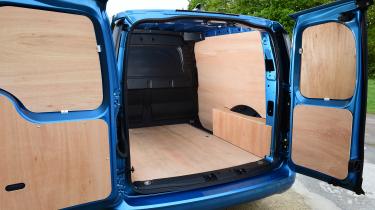
Pros |
Cons |
|
|
While VW offers SWB and Maxi versions of the Caddy Cargo, there’s no crew van variant, and all models have the same roof height. That means the line-up isn’t as comprehensive as some rivals – high roofs are a rarity in the small van class, but most of the Caddy Cargo’s rivals come in crew guise.
The standard Caddy Cargo has 3.1 cubic metres of space inside, but this is slightly less than you’ll find in the likes of the Renault Kangoo and Citroen Berlingo. There’s no through-loading bulkhead, either, so there are no options to expand the cargo space at all.
The cargo area is 1,797mm long, while the maximum width is 1,614mm. The distance between the wheelarches is 1,230mm, but it’s also the same measurement further forward, because there’s a step on either side for the sliding doors. The cargo area measures 1,272mm high, which is taller than that of a Kangoo. The rear doors offer an opening of 1,234mm x 1,130mm. With a top-hinged tailgate, the height is slightly lower, at 1,122mm. The sliding side door is a bit narrow, measuring 703mm wide and 1,096mm tall.
The Caddy Maxi has a longer wheelbase and an extended rear overhang when compared with the standard van, but a cargo volume of 3.7 cubic metres is half a cubic metre behind that of a LWB Renault Kangoo – it’s the same as a Citroen Berlingo, though. The Caddy Maxi’s cargo floor measures 2,150mm long and the same width as the standard Caddy Cargo. The maximum height inside is 1,275mm, while slightly longer side doors measure 846mm long and the same 1,096mm height.
At the back, the standard Caddy Cargo has a load lip that’s 586mm tall, while the Maxi is slightly higher, at 589mm. This is lower than a Renault Kangoo’s, so that might be a bonus if you’re carrying heavy loads. There are six lashing eyes on the load floor to help secure items in place.
Payload weights will vary according to specification, but they range from 725 to 631kg for the 1.5 TSI petrol model, 685kg for the 2.0 TDI 75PS, 698 to 683kg for the 2.0 TDI 102PS, and 710 to 660kg for the 122PS version of the 2.0 TDI. Adding a DSG gearbox will slightly reduce the payload weight, but 4MOTION actually increases it. The eHybrid doesn’t suffer a big penalty here, with a payload from 740-643kg. Either way, the Caddy Cargo is a little behind the class leaders, with the Renault Kangoo able to carry almost one tonne of payload in certain guises.
Reliability, safety and security
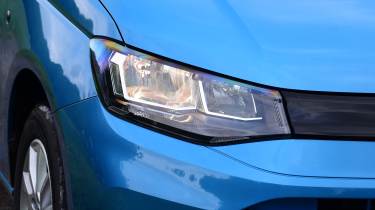
Pros |
Cons |
|
|
Sharing a platform and electronics with the VW Golf means that the Caddy Cargo benefits from some of the newest safety features that VW has to offer. As a result, it's quite well represented for safety kit, with only a few bits on the options list.
As standard, all models feature ABS with Brake Assist and post-collision braking, driver and passenger airbags (a passenger bag isn’t always offered as standard with rivals), plus side and curtain airbags. There’s Front Assist that automatically applies the brakes if it detects an obstruction ahead, including pedestrians, a driver tiredness monitor, electronic brake force distribution, lane-keeping assist and cruise control. The only real safety options are the addition of a central airbag between driver and passenger, and keyless entry and start.
As already mentioned, since the Caddy Cargo shares its running gear with the VW Golf, there’s plenty of familiarity with the cabin. The touch-sensitive controls in places are frustrating, but since they are used on a number of other models as well as the Golf, that means they should work consistently.
The VW Caddy Cargo comes with a fairly ordinary three-year/100,000-mile warranty, while VW’s Comprehensive or Major Component coverage offers warranty extensions to suit different budgets. These can be paid for outright or in instalments.
Driving and performance
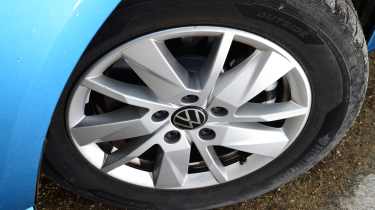
Pros |
Cons |
|
|
If you enjoy driving, then the VW Caddy Cargo is one of the more engaging small vans, courtesy of those Golf underpinnings. The steering is positive, with good response, and is backed up by a nimble chassis. All versions of the Caddy Cargo feature an electronic differential lock that helps with traction out of corners – it’s not quite the same as the XDS electronic diff that’s fitted to sportier versions of the Golf, but it boosts the van’s agility all the same. As with any van, the rear suspension is designed with payloads in mind, so there’s a bit of bounce when unladen, but it’s no worse than any rival.
Manual gearboxes have the familiar solid feel of other VW models, and all Caddy vans come with a six-speed transmission as standard. This makes the most of the torque on offer from the petrol and diesel engines, so you will never feel as if you’re in the wrong gear.
The 2.0 TDI 122PS engine is also available with a seven-speed DSG twin-clutch gearbox. This helps take the strain out of driving, and is one of the better automatic gearboxes available. It shifts smoothly and doesn’t suffer from the hesitation that blights some other transmissions.
The diesel Caddy Cargo is a decent performer whichever version you choose, thanks to its 2.0-litre capacity. Acceleration is smooth, although the lower-powered models do run out of steam quite quickly. Refinement is acceptable, although this is one area where the Golf will always take a lead over the van, while the fitting of a plastic bulkhead instead of a metal one means more noise is transmitted from the cargo area into the cab.
Rearward visibility is decent, thanks to the large door mirrors. Rear parking sensors are standard on all models, as is an electronic parking brake. Top-spec versions also feature front parking sensors. VW also offers reversing cameras and blind-spot detection as options to help with awareness of your surroundings.
One bonus is that the Caddy Cargo can be fitted with ergoComfort seats. These have been certified by German authorities to promote healthy backs, making the Caddy Cargo a top choice for long-distance driving.
Town driving, visibility and parking
The Caddy Cargo’s fairly compact size and car-based platform make it a doddle to drive around town. While the clutch and shift in manual versions is slick, driving in heavy traffic is even easier if you go for the DSG automatic in either the diesel or eHybrid. It’s easy to see out from the driver’s seat, and the suspension does a good job of soaking up most bumps.
Motorway driving and long-distance comfort
There’s not much to fault at higher speeds either - every engine on offer is smooth on the motorway and doesn’t feel overly strained. We’d probably avoid the 74bhp diesel if you mainly drive on faster roads, but its main drawback is acceleration down sliproads and for overtaking slower traffic.
Cab interior and technology
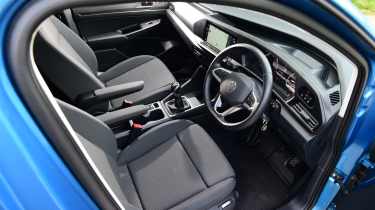
Pros |
Cons |
|
|
Hard plastics are used throughout the cab, but that’s not such a bad thing for a vehicle that is designed with work in mind. The layout is decent, and those plastics aren’t as brittle as those found in some rivals, with a soft feel for the dash top, especially.
There’s fabric upholstery and rubber flooring, but one concession to comfort is that the multifunction steering wheel from the Golf is fitted as standard. There’s a dot-matrix trip computer display between the dials – again sourced from the Golf – while the top-spec Commerce Pro adds digital dials from the Golf, too.
There’s a lot of storage inside. The top of the dashboard is designed with a full-width tray across it, along with a decent-sized glovebox. There are deep door bins, but an overhead shelf costs extra. Unlike some rivals, the Caddy Cargo does not offer a three-seat option. However, VW does provide an optional folding passenger seat back, allowing it to be used as a table.
Standard equipment on the Caddy Cargo in Commerce spec includes a hard plastic bulkhead, fabric seat upholstery, cruise control with speed limiter, electrically adjustable door mirrors, electric windows, LED interior lighting, a multifunction steering wheel, steel wheels with plastic trims and a puncture repair kit (a spare wheel is available as an option).
Infotainment, sat-nav and stereo
The infotainment system consists of a large 10.4-inch touchscreen with DAB radio, Bluetooth and two USB-C sockets, but only two speakers, while there’s a dot-matrix multifunction display and trip computer between the dials.
Safety kit includes ABS, an immobiliser alarm, cruise control, twin front airbags, eCall emergency system, tyre pressure monitor and a puncture repair kit.
Move to the Commerce Plus trim, and you’ll gain body-coloured bumpers, rear parking sensors, air-conditioning, a driver’s seat armrest, leather trim for the multifunction steering wheel, electric lumbar support for the driver’s seat with ergoComfort padding, and wired smartphone connectivity.
At the top of the range, the Commerce Pro trim adds luxuries such as alloy wheels, front and rear parking sensors with a reversing camera, gloss black mirror housings for the heated and electrically adjustable door mirrors, body-coloured door handles and a heated windscreen. There are also LED tail-lights, twin armrests for both front seats, heated front seats, heated screenwash nozzles, keyless entry and starting, a 10-inch colour touchscreen with sat-nav, four speakers, and wireless smartphone connectivity, plus VW’s digital dials.
Buying and owning
It might seem odd to offer a van with a pure petrol engine, but the Caddy TSI model works pretty well if you don’t need to drive big miles. It’s affordable, quite efficient and well-suited to short trips.
Of course, the grunt and fuel economy of the diesels will appeal to high-mileage customers, but the arrival of the eHybrid makes the Cargo Caddy an even more interesting proposition. With an electric-only range of around 70 miles, it’s by far the cleanest version.
It’s a shame the Caddy Cargo doesn’t get the ‘5+ Promise’ five-year aftercare package VW has launched with the bigger Volkswagen Transporter, but the Caddy’s three-year/100,000-mile warranty is still fairly competitive.
Alternatives
Rivals for the VW Caddy Cargo are plentiful in the small van class and include the popular and recently relaunched Ford Transit Connect. The Citroen Berlingo is a perennial favourite, and it remains a very strong option, with different van lengths available, a five-seat crew version and payloads that can go up to one tonne. The Berlingo is joined by a number of virtually identical models from a variety of manufacturers that offer similar abilities and differ only in looks, price and minor specification changes. These include the Peugeot Partner, Vauxhall Combo, Toyota Proace City and Fiat Doblo.
In a similar vein, the Renault Kangoo and Nissan Townstar also share tech between them, while the Mercedes Citan is based on the same engineering, but with a bit of Mercedes star quality added – at a price.
If you don’t need to carry a heavy payload, then the estate-based Toyota Corolla Commercial offers an even more car-like drive than the Caddy Cargo. There are also commercial SUVs as an alternative, with models such as the Suzuki Jimny Commercial and Land Rover Defender Hard Top on offer at different price levels.
Van dimensions | |||
| Body style | Height | Width | Length |
| L1H1 standard van | 1,856mm | 1,855mm | 4,500mm |
| L2H1 Maxi van | 1,860mm | 1,855mm | 4,853mm |
Load area dimensions | ||||
| Body style | Height | Width | Length | Volume |
| L1H1 standard van | 1,272mm | 1,614mm | 1,797mm | 3.1m3 |
| L2H1 Maxi van | 1,275mm | 1,614mm | 2,150mm | 3.7m3 |
Frequently Asked Questions
Based on Golf underpinnings, the Caddy Cargo is one of the best vans to drive, and it gets plenty of car-like tech. It’s also competitive for cargo-carrying, especially in long-wheelbase Maxi guise.
